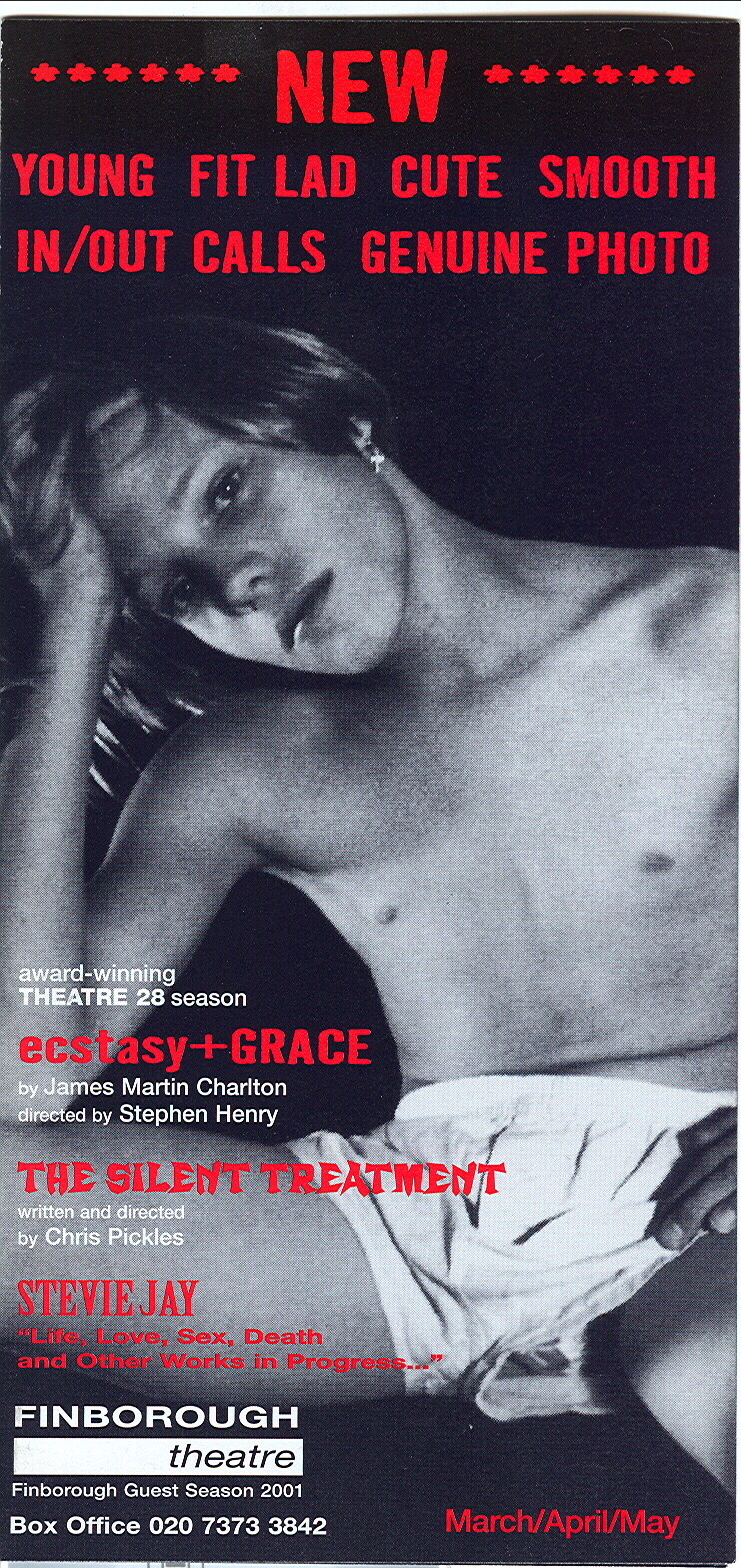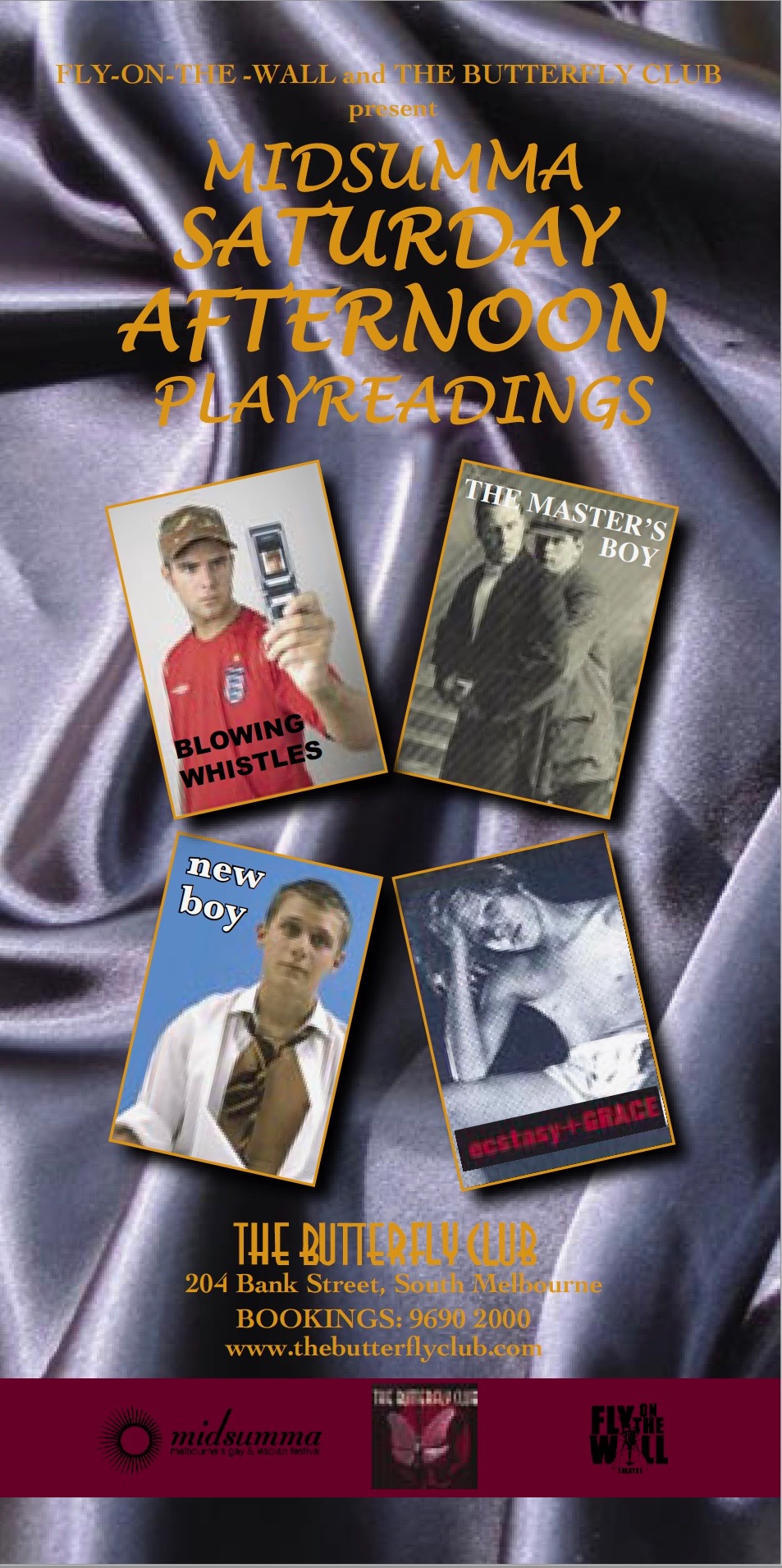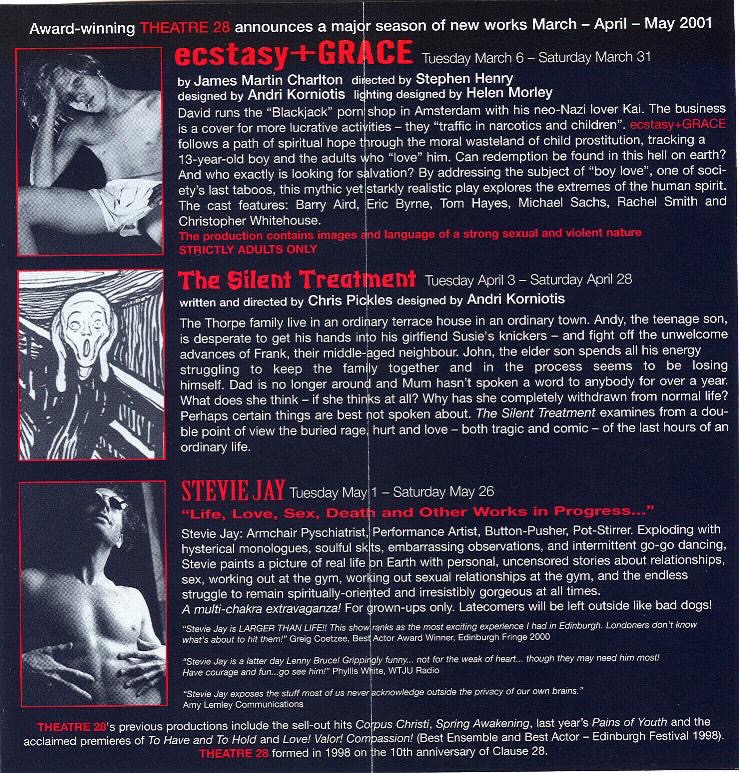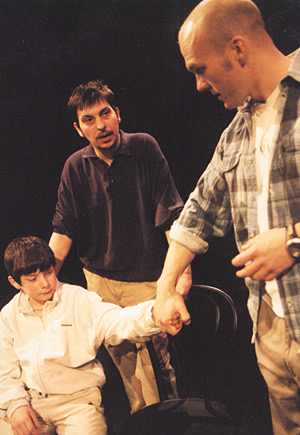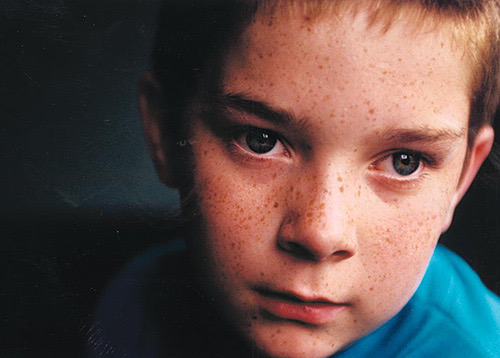ecstasy + GRACE (Abyssinia)
Note
If I had any sense, I probably wouldn’t have written this play. I never let my writing career be guided by sense. In 1997 I caught a Network First documentary called The Boy Business, about a vile bunch of British paedophiles exploiting kids in Amsterdam. I read an article which went alongside it in The Guardian by Nick Davies, Melanie McFadeyan and Eamon O'Connor. There was a graphic description of a video called the Bjorn Tape, which features an adolescent boy being abused.
I couldn’t get this stuff out of my head. The whole child abuse thing is rotten in itself – I’d written about it previously in Coming Up – but this selling of children as commodities for pleasure seemed to speak to a whole lot of trouble. The idea of humanity and buying and selling… I was bothered about the whole development of Protestant Capitalism, which began funnily enough in Amsterdam. The betrayal of that Anabaptist Inner Light. There’s even something about the word Netherlands…
All this was churning in my head. A play is a dream, rather than a rational statement or argument. The Bjorn tape fused with some contemporaneous reading and listening: a book called Invisible Republic by Greil Marcus on Bob Dylan’s Basement Tapes & the folk song tradition; Dylan’s recent recording of the folksong Blackjack Davy; a biography of Rimbaud which concentrated on the Abyssinian years after he’d abandoned his poetic mission… Strong camembert before bedtime. Visions in the night. I called the result Abyssinia.
My protagonist Davy – aside from being a person in a story – I hoped would have a wider resonance, allowing us a vision of our society. I was suggesting that we as a culture have walked away from our lives’ meaning. A tradition of seeing the world imaginatively, in the language of myth, poetry and symbol, has been abandoned. We're left with the bald facts. All too often those facts lead to the corpse of a child. That old devil called Moloch again, which Ginsberg saw devouring the young…
Abyssinia had a reading at the Drill Hall, which got a strong and positive reaction. The major new writing venues all read the play and passed, for which I am sure they were later truly grateful. It got taken up by a gay-themed themed company, Theatre 28. The director didn’t think that Abyssinia was a marketable title. So the play got renamed, a kind of equation: ecstasy + GRACE. If it ever gets done again, revert to the first designation.
The cops investigated us before we opened. I had to deliver a script to Earl’s Court police station! The mainstream press got interested and did lots of previews, then turned on us like vipers. Most of them reviewed it with a pathological fury and hatred. I was distressed by the reaction. I felt like the stranger who gets taken to the town's outskirts and kicked near to death, as a warning.
We should never have sold it like it was a paedophile Play for Today. My plays are for all days: past, present, and future. The content offers images, not journalism. Some of the less well-known critics did like the play. We sold tickets enough. Audience reaction was marmite mixed, love it or hate it. It did my career irreparable damage. But as I say, I never had very much sense about that kind of thing.
Story
Amsterdam, late-20th Century. Davy is a pimp and the manager of a sex shop called Blackjacks. He lives with his German skinhead lover, Kai, and reckons he is doing just fine. But he's a man with a past. Today that past arrives to catch up with him.
Davy wasn't always living a life of sex, drugs, and exploitation. Back in the day, he was an evangelical preacher - full of Scriptural visions, set on opening men's minds to Christ. His once-fellow Salvationist Rae turns up at the shop, determined to bring it all back home.
But Davy's not listening. He's got debts to be collected and goods to be delivered. A customer, Lowe, arrives to sample Davy's wares. Davy has just the right merchandise - drugs, videos, and a 13-year-old boy.
Pullet has his head buried in computer games and in dreams of the latest trainers. To get what he wants he has to work. But this time Davy might have sold the kid to the wrong consumer. Lowe is a predator with vicious tastes. Davy is forced to face how far he's fallen from his vision of creating a paradise on earth for all.
Casting requirements: 1 f, 5 m
Production(s)
Reading: (as Abyssinia) Friendly Fire Productions at Room 1, The Drill Hall, London, 14 October, 1998
Cast: Richard Earthy (Grimes), Greg Elfer (Pullet), Alice Kennedy (Rae), Euan Macnaughton (Lowe), Thomas Murphy [Tom Hayes] (Davy), Peter Stark (Kai)
Directed by Robin Dashwood
Produced by Friendly Fire Productions
Premier: (as ecstasy + GRACE) Theatre 28 at Finborough Theatre, 6-31 March, 2001
Cast: Barry Aird (Lowe), Eric Byrne (Pullet), Tom Hayes (Davy), Michael Sachs (Kai), Rachel Smith (Rae), Christopher Whitehouse (Grimes)
Directed by Stephen Henry; designed by Andri Korniotis; lighting by Helen Morley
Produced by Stephen Henry for Theatre 28
Reading: (as ecstasy + GRACE) Midsumma Saturday Afternoon Playreadings at The Butterfly Club, Melbourne, 2006
Produced by Midsumma/Fly on the Wall
Press/Audience Reaction
"There are some subjects we would rather not think about, and it takes a courageous and determined playwright to force them to our attention. When the subject is homosexual paedophilia, and the play is produced by a gay-oriented theatre company, something very special is going on. Even if the play were not as good as it is, Theatre 28 would deserve applause for taking on a topic they could be forgiven for wanting to sweep under the rug.
James Martin Charlton's powerful drama addresses exactly this impulse to disassociate oneself from the most unsettling facts of life and of one's own character. Davy, an English pornographer and pimp operating in Amsterdam, is introduced as a man of high intelligence, quick wit and even a strong sensitivity to moral issues. We are guided to believe and even empathise with his ability to juggle his ethics, his real affection for the boys in his charge, his sympathy for the warped hungers of his adult clients, and his commercial exploitation of all of them…. But then a shocking turn of events, all the more horrifying because of its inevitability, makes the contradictions in his life no longer sustainable, and he is forced into a deeply spiritual inner journey of despair and possible redemption…. The play manipulates us with great effectiveness by first presenting its characters as adjusted, content and even sympathetic... as powerfully thought-provoking and emotion-stirring as its author could wish." – Gerard Berkowitz, The Stage
"It neither flinches from its material nor seems emotionally dishonest… moments of genuine, unsettling force." – Metro
"In his controversial new play about paedophilia, Charlton's trick is to present monstrous characters as articulate, human and benign. Child victim Jamie is normal, school-boyish, preoccupied with trainers and Walkman but also keen for a tab of E or a toke on a friendly joint: his procurer is a sympathetic and caring older brother figure, with a neo-Nazi boyfriend so attractively seductive you fall for him. J K Rowling may not have yet written Harry Potter and the Paedophile Ring but we are dangerously close to it here.
When it works, it's excellent: the main paedophile character is drawn with a balance of onanistic urgency, addiction, fear and self-justification to a degree that I found myself glancing around the audience to try to identify his likeness... the writing [is] occasionally lyrical and even funny: broad literary and historical references embrace the audience, and moments of humour provide safety valves from the sordid central theme... Although flawed, this play is well worth a visit. I wish there had been post-show discussions because there are so many unanswered questions, but given the subject matter, perhaps it's just as well." – queercompany.com
"Sharply unsettling" - The Independent on Sunday
"The final 15 minutes, which feature serious reference to Rolf Harris's Two Little Boys song and. a spiritual 'duel' between the half-naked Salvation Army follower Rae and the all too easily convinced Davy, is actually. rather memorable. But only because it is so loopy." - Lyn Gardener, The Guardian
"... a grubby and distressing play" - Charles Spencer, Daily Telegraph
"... this ridiculous farrago" - Paul Taylor, The Independent
"There's no pleading for child lovers to be allowed to have their ways with boys - or girls. Quite the reverse... Rae has, unbelievably, come to save the lost soul of Davy... Charlton takes this moral hygiene mission seriously…" - Nicholas de Jongh, Evening Standard
"The most memorable scene here is played between Hayes' Davy and the young Eric Byrne, excellent as wide-eyed child prostitute Pullet. Davy's deluded love for Pullet is normalised, while his exploitation is rationalised as nothing more than another capitalist enterprise" - What's On
"sub-sub-sub-Graham Greene" - Ian Shuttleworth, Financial Times
Selfish Little is one of a number of unreadable books by the self-consciously “transgressive” American writer Peter Sotos. In it, the author/narrator – in his usual affected (?) guise of paedophile sexual predator – sees ecstasy + GRACE at the Finborough. As with the mainstream theatre critics, Sotos’s nonce narrator has a pretty bad time at the play…. - Sotos, Peter Sefish Little: The Annotated Lesley Ann Downey (New York: Void Books, 2004), p164-166
